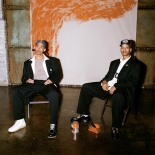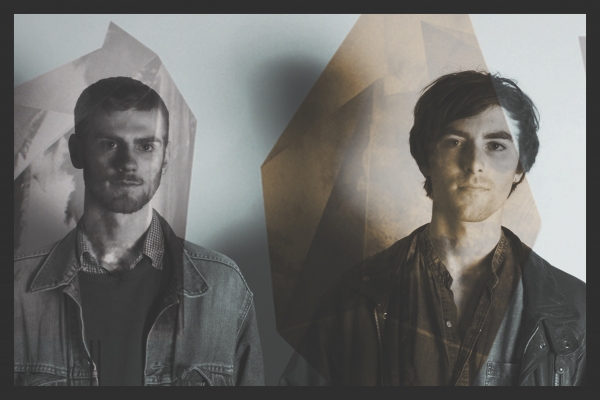
The Sound of Bristol: Body Clocks
Posted on: 25 Nov 2016We sit down with Chiverin-signees Body Clocks, the Stokes Croft-based duo who create sprawling pieces of ambient dance music, to form the fifth instalment of our exposé on our city's music, The Sound of Bristol.
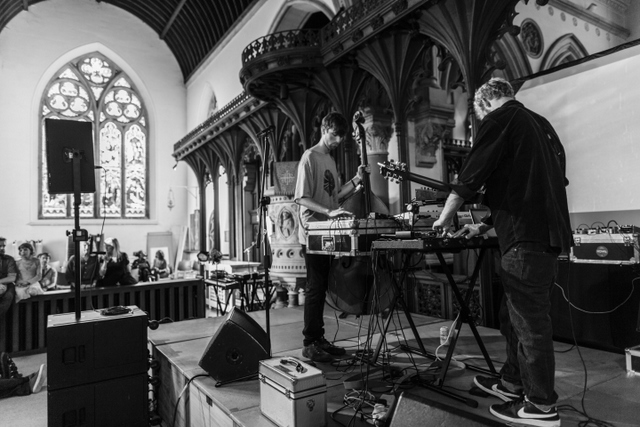
There’s a lot in a name. The juxtaposition of the two words which make up Body Clocks is indicative of a tension central to the song-writing process of the Bristol-based pair who (almost, save an ‘e’) share one. The duo, comprised of Jo Kaspar and Joe Craven, are constantly trying to reconcile the ticking regularity of electronica with the live music that is entirely physical, bodily.
As they are crafted, their tracks weave back and forth across the divide between the two: ‘The interesting thing for us is recording the initial jam live, then sitting down to produce the track over a few days and months, and then being able to put it back into the electronic live setting,” explains Kaspar. “When performing, we have usually stripped back a track allowing us to improvise and play as many of the parts live as possible.”
The songs in question, sprawling, ambient soundscapes powered by driving beats, are therefore designed with performance at the front of the mind. “The idea is making it all as real as possible in the live setting,” affirms Craven. “Even the electronic parts- we don’t necessarily know when those are going to be set off, so it’s all quite improvised. Add to that our three synths, drum machine and the live instrumentation.”
This live instrumentation is as fluid and flexible as the music the boys make, with various combinations of sonorous devices (including guitar, moog and keyboard) tailored to fit the space and crowd to which they play. One slightly unconventional permanent fixture, however, is Kaspar’s double-bass. Well, when they can fit it in the car. “It’s always been a part of the make-up - Jo played it when we started, so it was just included from the off,” says Craven of his hermano’s huge fiddle. “It’s a really nice instrument.”
“We definitely tailor our sets to the audience, something that’s exemplified by the double-bass - some venues just aren’t appropriate for it,” Kaspar elicits. “Or we can’t fit it below the ceiling. We play our residency nights in a packed, dark, little room and it feeds back too much in there.”
Their capacity to adapt masks another striking duality to their output, with techno influences intentions at loggerheads with an altogether calmer intent. Nimbly tip-toeing along what they call ‘the line between dance music and ambient music’, Body Clocks’ output is most succinctly defined by Craven’s coining of ‘dance music that you could listen to at home.’
The music which results therefore skirts the dancefloor, intelligently caressing the ear while galvanising the feet only ever moderately. First singles ‘Still Life’ and ‘Dusk’ owe a great deal to producers like Jon Hopkins and Rival Consoles, who Kaspar counts as key influences: “Those are the guys that I put on pedastals as guides to how you should produce music and how to get really great sounds,” he permits himself to gush. “Those guys make really great dance music but do it in an unusual way that’s more harmonic and more melodic and more interesting to listen to, rather than just…” tailing off to recreate a repetitive, Adam Beyer-esque tech banger.
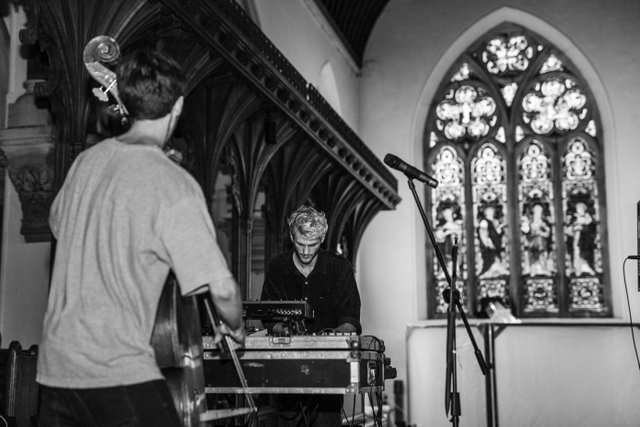
The lyrical void that these melodies leave prevents any didactic outlet, as there are no words to literally convey any agenda or idea. This has played on the mind of Craven, who confesses, “I’ve been thinking recently about how our music could affect and whether it has any importance or meaning because it is essentially abstract, even though things are happening that make me very angry and I can’t vocally express that in my music.”
Though wordless, however, the tracks speak volumes, with each production revealed to be a reflection of the duo’s contemporary subconscious: “The songs don’t have any conscious sentiment, they’re not lyrical at all,” Craven admits. “I think it’s subconscious; the track will sound a certain way, but we’re not really aware of that when we’re making it. You’re never entirely sure how it should sound, but it does reflect your mood.”
Kaspar posits an example: “I started making a track after Trump was elected, which was pretty fucking depressing. At the time I wasn’t aware that I was making a song that was p*ssed off at the world, but it is reactionary in a subconscious way.” He goes on, “A lot of people are very angry and upset with the world at the moment and I guess the darker direction that our music is heading reflects how we are feeling even though it's not a conscious decision.”
The uncertainty with which they respond to this new, uncertain world is polarised against the decision with which they play together live. Having been best friends since the age of 11 and lived together for the last two years, the pair share more than just a Christian name: namely, they believe, this subconscious.
Kaspar explains, “We’ve got that real connection of being able to intrinsically know what the other one is going to do and when. Knowing when we’re going to have a drop or when to keep something building is really cool. I’ve watched back some footage of our gigs and we don’t look at each other. It’s almost telepathic.”
“Earlier on, when we were less confident and just trying to focus on what we were doing, someone told us that we needed to interact and catch eyes more often,” he remembers. “But a couple of weeks ago the same person told us that they loved that we don’t look at each other; because we barely need to anymore.”
The first of these frantic, eyes-down-out-of-necessity shows was organised by Aled Chiverin, the Bristol music mogul who fell in love with the demo of ‘Still Life’ two years ago and has gradually become Body Clocks’ manager. Through their adoption into the Chiverin family (of which Aled is ‘the big daddy’), they have formed strong relationships with their ‘sisters’ Rhain and Fenne Lily, and sampled first-hand the collaborative and cooperative ethos which is currently overarching in the city’s music scene.
“The Bristol music scene is so small and so friendly that you can meet all the bands that you look up to,” says Craven. “We went to a Giant Swan gig and fangirled massively, but then three months later we were able to book them for our own night. So it’s not hard to meet people and talk to them. You can just approach people and talk to them rather than going through their manager; it’s a much more personal process.”
The night mentioned is their monthly residency at Take Five in Stokes Croft, which allows a platform for everything along the spectrum of Bristol’s eclectic musical reaches, with the boys moulding their sets accordingly.
Aled’s influence has also found its way into the other venture occupying the minds of Body Clocks at present: their forthcoming EP. With its arrival expected in March or April, the project has proven a testament to the virtue of patience: “It’s taken much longer than we thought it would,” says Kaspar. “We initially planned to mix, master and release the EP ourselves back last summer but since then, the direction of our music has changed and we met Aled as well as Austen who we have mixed the first 3 tracks of the EP with. It was really refreshing to take apart older demos and revamp them. As it stands, the EP has become more of a collection of our 4 favourite tracks to date rather than ordered chronologically. The way that they flow and develop into each other and the improvisation in the live setting is where the fun begins.”
Through shadowing Austen in the studio, their work on the project has allowed them to develop their mastering ability: "We've learnt loads from him and feel like we're really getting to grips with the mixing process," says Kaspar.
And this graft is paying visible dividends, with the pair set to mix the fourth track on the EP themselves. The environment fostered at Chiverin, which houses expert industry nous within a strain-free atmosphere, has allowed them to grow in these ways without applying excessive pressure.
“What’s really great about Chiverin is how relaxed Aled is, and how much he has given us the freedom to do what we want whilst helping us where we need the help,” Kaspar acknowledges, aware of how lucky they are. “Friends of ours have been locked into record deals which assume artistic control and strictly enforce album release dates. We definitely wouldn't want to be pressured or rushed into releasing an album without feeling that people were really clamouring to hear it, without having built up the momentum organically beforehand.”
With those clamours set to grow in correlation to the exponential musical development of Body Clocks, it seems like only a matter of time before Kaspar and Craven join the country’s sonic big leagues. One thing is for sure: they will be playing venues big enough to fit a double-bass into.
Article by:
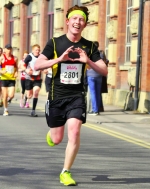
An ardent Geordie minus the accent, Sam seemingly strove to get as far away from the Toon as possible, as soon as university beckoned. Three undergraduate years at UoB were more than ample time for Bristol (as it inevitably does) to get under his skin, and so here he remains: reporting, as Assistant Editor, on the cultural happenings which so infatuated him with the city. Catch him at sam@365bristol.com.

